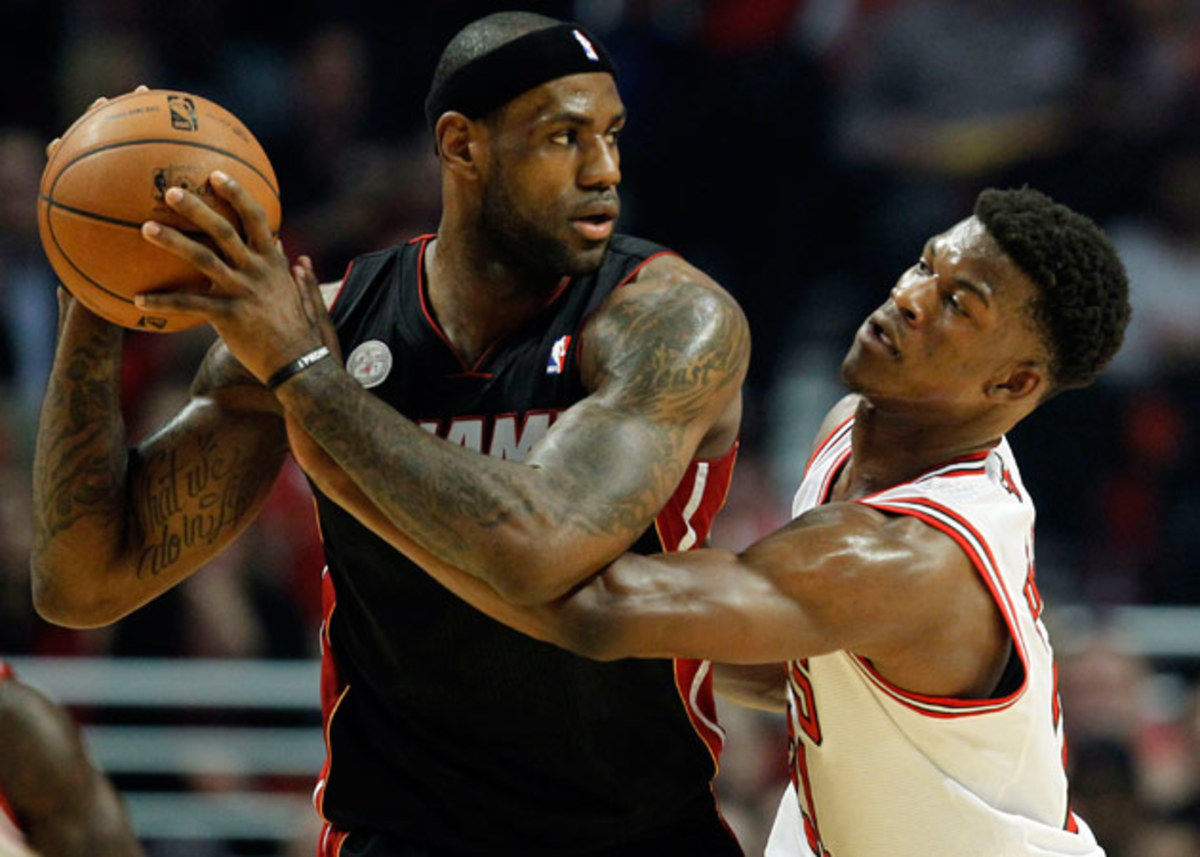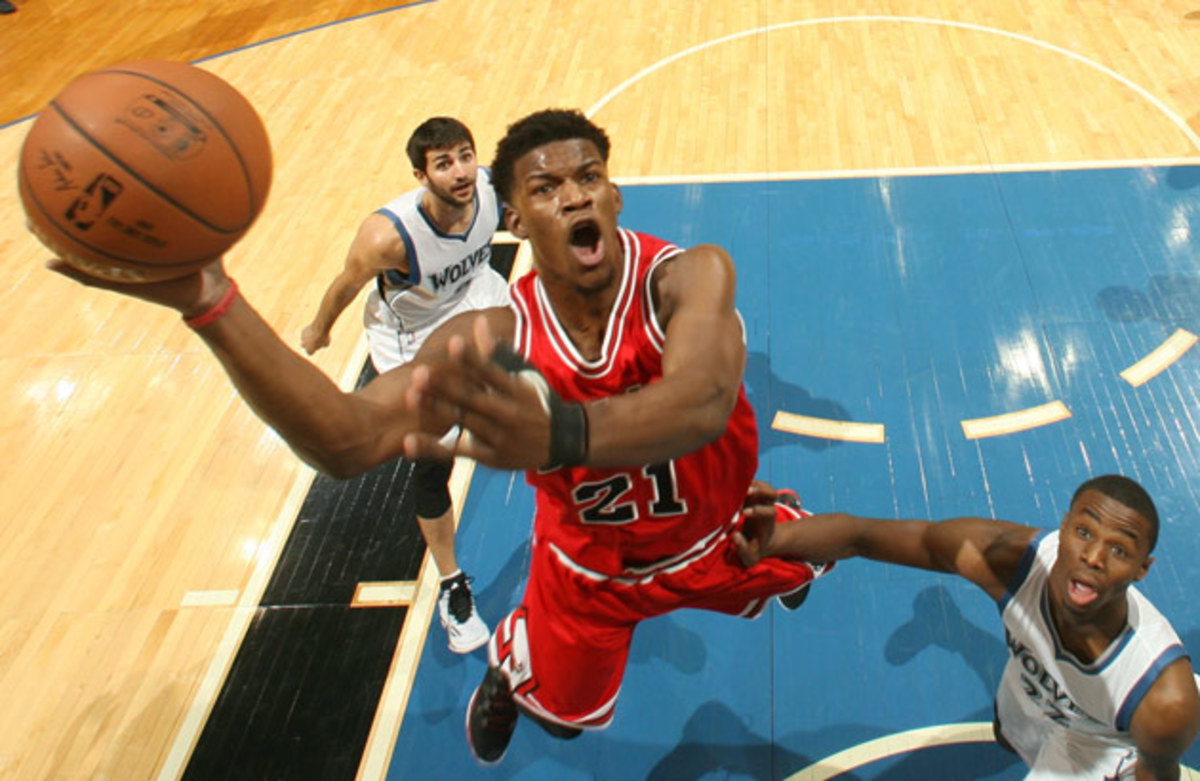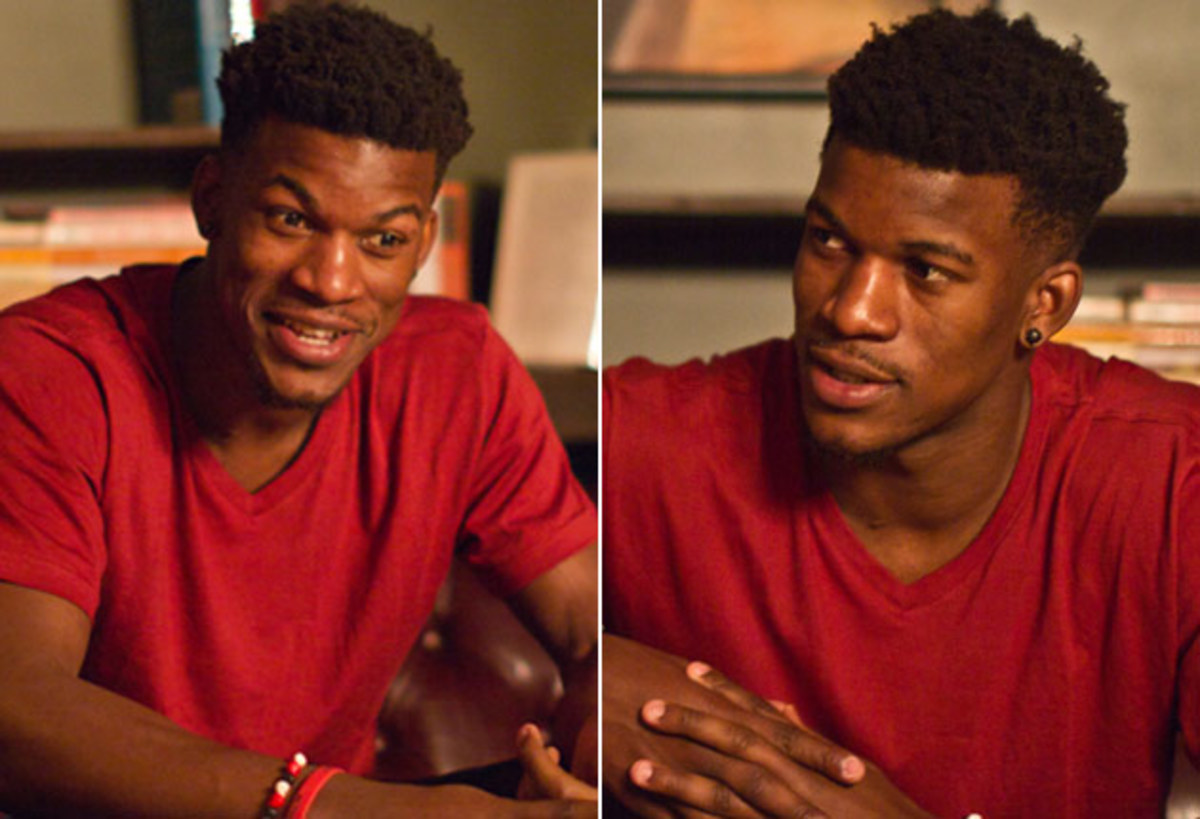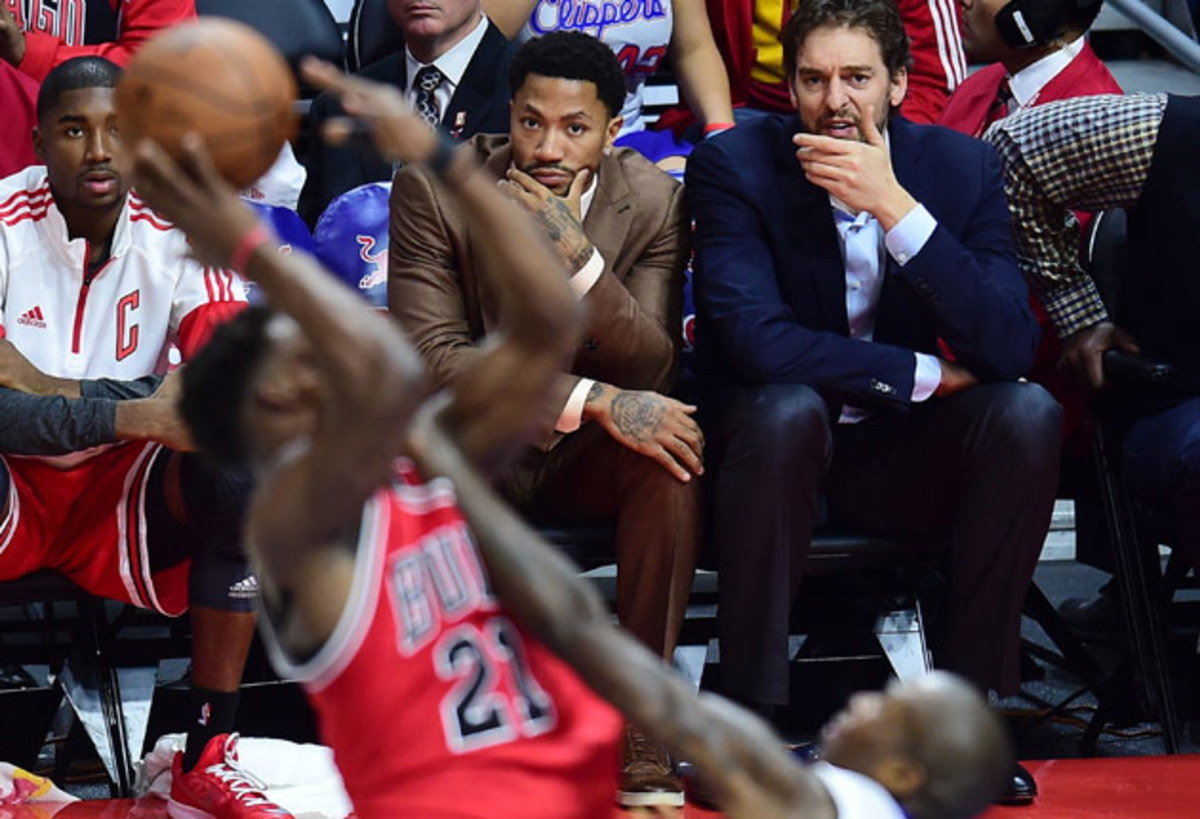Behind the scenes of Jimmy Butler's rise to the brink of NBA stardom

Jimmy Butler’s smile says it all: It's been a good month for the Bulls' budding star.
Back in Butler’s hometown of Tomball, Texas, they might even use a phrase like “boom times” to describe his strong start this season. Chicago’s defensive-minded shooting guard is averaging 20.8 points and posting career-high numbers across the board. Not only is Butler looking like a leading candidate to become a first-time All-Star, he is also emerging as one of the most-coveted free agents of the 2015 class.
The smile crept across Butler's face again as he thought back to the Tomball teenager who, even though he wasn’t recruited by a single Division-I school, was convinced that he was the best player in the country.
“Derrick [Rose] and I were both in the Class of 2007,” Butler told SI.com during an extended interview in Portland, where the Bulls were playing, on Saturday.“At that time, I never paid attention to the game. I didn’t know this guy was No. 1 in the nation or this guy was No. 10. Some of my teammates did and obviously Derrick was No. 1 in the nation. They’d come to the games and say, ‘Did you see what Derrick Rose did last night? Simeon High School! Chicago, Illinois!’ Everyone in the nation knew who Derrick Rose was.
“Me being myself, I was like, ‘Let him come down here, I’ll give him 40.’”
This season’s success is happening fast for a player with an “ego” – Butler’s term – which was broken down over the next four years. He settled for one year at Tyler Junior College (Texas) before catching on at Marquette. It’s happening fast for a player who contemplated leaving the Golden Eagles on numerous occasions because he was forced to pay his dues, minutes-wise, and because he wasn’t aware that Wisconsin winters would be any different than what he experienced in Texas. This is all happening fast for a man who spent years of his high school life without a permanent home, kicked out of the house by his biological mother at age 13 before he was finally taken in by a friend’s family.
The All-Star talk and max-contract chatter would be hard for anyone to process; imagine how surreal it must seem for Butler, whose only worldly possessions as recently as seven years ago were a well-worn collection of t-shirts and basketball shorts.
Although Butler grew up idolizing Tracy McGrady, he found his own way into the first round of the 2011 draft by refocusing his attention on the defensive end. A big portion of Butler’s defensive impact can be attributed to his relentlessness and indefatigability. While that motor was first recognized by a national NBA audience during postseason matchups with LeBron James, Butler has commanded respect around the league with his rare tenacity, which led to a 2014 All-Defensive Second Team selection.

Perhaps it shouldn’t be a surprise, then, that this ball of motion is taking his early-season breakout in stride. Asked if he has heard the growing social media buzz that that he might receive a max-type contract offer next summer, a la Klay Thompson, Butler nods and accepts the idea as both a challenge and an opportunity.
“Why not have a [max contract] be a goal? When I hear ‘max player’ I just think about being able to take my family to Bora Bora or something, going on a nice vacation. Because I don’t really pay attention to the money,” Butler said. “I just love the game of basketball. As long as I’m happy and it’s my job, I’m good. Money has never been too much of a thing for me. I grew up without it. I can manage with the amount of money I have now.”
• MORE NBA: Bulls down to No. 11 in latest NBA Power Rankings
Butler, 25, is earning $2 million in the fourth year of his rookie contract. Back in October, he declined a rookie-extension offer worth at least $40 million over four years. He delayed his eight-figure gratification even though he spent years in high school without a permanent home, making due on a day-to-day, hand-to-mouth, couch-to-couch basis. Butler admits that it was “hard” to pass on the extension and jokes that his first reaction, when presented with the offer's terms, was: “Bet! We’re good!”
Upon further reflection, and advice from his agent Happy Walters, Butler decided to play out this season and test his earning potential next summer, when he will become a restricted free agent. Market conditions certainly influenced that strategy: less-accomplished players like Kemba Walker ($48 million over four years) and Alec Burks ($42 million over four years) earned larger deals, while upper-echelon, two-way wings like Thompson ($70 million over four years), Gordon Hayward ($63 million over four years) and Chandler Parsons ($46 million over three years) all struck gold. The prospect of the NBA’s salary cap swelling to the $80 or $90 million range in 2016 also promises to swing some leverage in Butler's favor, provided he is able to take a meaningful step forward this season.
Ultimately, Butler’s thinking boiled down to a belief that he possessed sufficient untapped offensive potential that could bump him up into a higher tier.
“The world knows I love Chicago. This is where I want to be,” Butler said. “I think this is where I’m going to be. After last year, everyone was like, ‘He’s not this. He’s not that.’ I knew better. I wanted to prove to myself that last year wasn’t me.”
Summer Of Work

While Butler averaged 13.1 points, 4.9 rebounds and 2.6 assists in 2013-14 – all career highs – he shot a career-low 39.7 percent from the field and just 28.3 percent from deep. His Player Efficiency Rating (PER) of 13.5 was modest, even though other advanced stats, like Win Shares, treated him more favorably.
That statistical profile didn’t necessarily scream “monster pay day,” but there were a number of extenuating circumstances at play. Last season was Butler’s first as a full-time starter, and that new level of responsibility required an adjustment period. There were times, he acknowledges, when he was still reminding himself that he “belongs” in the NBA. To complicate matters, he spent most of the season without Rose and without many other established offensive weapons around him. Meanwhile, he was playing 38.7 minutes a night, second-most-in the league, and he was doing it for coach Tom Thibodeau, whose primary concern is always defense before offense. Finally, Butler was dealing with a foot injury that limited him.
The Fundamentals: How Bulls' offense grew through Derrick Rose's injuries
“I was hurt, I was moving sluggishly, I was heavier,” Butler said, explaining that his 2013-14 performance shaped his approach to the 2014 offseason. “That all played a role in my shooting being down. This summer, I put in hella work on ball-handling, finishing at the rim, mid-range shooting, post work, and threes. The more you see the ball go in, the higher your confidence is going to be.”
Butler embarked on a carefully structured workout regimen in Houston with the goal of filling out his game. His days generally began at 7 a.m. and ran until 8 p.m. – with breaks for meals and a mid-day nap -- and included individual skill work, weight training, running on the track, full-court scrimmages, yoga, and Pilates.
Butler and his friends rented a house for the summer so that they could spend time together, but he says he purposefully chose not to furnish it.
“I wanted to be so good at the game that we didn’t have cable, we didn’t have the Internet,” he recalled. “Whenever we got bored, all we would do is go to the gym. We’d eat, sleep and go to the gym. We’d go three times a day because we didn’t have anything else to do. We were sitting on the couch, looking at each other, saying, ‘What the hell are we going to do all day?’”
All-Anomaly Team: Five NBA outliers pulling off strange statistical feats
A fan of McGriddles during college, Butler now sticks to a diet that mostly consists of chicken and, to his chagrin, vegetables. He weighs 232 pounds, down 12 pounds from last season, when he had attempted to bulk up so that he could bang with the likes of James and Joe Johnson. Butler’s trainer, Chris Johnson, built on that base of physical exertion and dietary regulation by helping Butler review his offensive moves on tape and by encouraging him to read the Bible, which Butler said has helped with his focus and trust in his own abilities.
The fruits of those labors and sacrifices are showing. After the Bulls' offense sputtered last season without a No. 1 scorer in Rose’s absence, Butler has done well filling that void so far this year. His newfound confidence is most evident in his attacking mentality. With Rose in and out of the lineup, Butler is averaging a career-high 7.3 free throw attempts (No. 6 in the league), and 46 percent of his field goal attempts have come in the basket area (up from 36 percent last season). An excellent offensive rebounder for his position, Butler is hitting the glass and pulling down a career-high 5.8 rebounds.
Butler’s aggressiveness is translating. Chicago’s offensive rating has been significantly better with Butler on the court (106.5) than off (100.2), and his 21.8 PER ranks second among starting two guards in the East (trailing only Dwyane Wade). Most importantly, the Bulls sit atop the Central Division with a 9-5 record, even though Rose, Taj Gibson, Pau Gasol and Kirk Hinrich have missed time recently due to injuries.
Honing His Craft

Although the size of his next contract will be influenced by how well he is able to maintain his hot start, there’s no question that the bread-and-butter of Butler’s game remains his individual defense. Those skills will go under the microscope again in April, as all of Chicago’s major conference foes possess match-up targets for Butler: Cleveland (James), Toronto (DeMar DeRozan), Washington (John Wall and Bradley Beal), and Miami (Wade).
Butler, who succeeds by crowding and shadowing his man, takes a purist’s approach to his craft. He studies tape of his opponents to understand what he’s up against, but he rejects the use of statistical tendency profiles. He doesn’t want to know which way a player prefers to drive, according to the numbers, or where a player’s hot spots are on the floor. He prefers to trust his instincts and technique rather than situation-based scouting reports.
“I just guard. I guard everybody like they’re the best player in this league,” he explained. “The dude may go right every single time. But it’s going to happen, whenever I’m guarding him, the m----f---- is going to go left. I’ve just got to guard him. I hate when people say, ‘He’s not a shooter. Don’t play him as a shooter.’ As soon as I don’t play him as a shooter, he makes a three. It’s the most frustrating thing in the world.”
There’s that smile again.
While You Weren't Watching: Giannis stretches, J.R. Smith whirls and more
The video study isn’t limited only to current opponents. In fact, Butler finds himself watching clips of Michael Jordan for fun, like anyone else, but also as a teaching tape when it came to expanding and refining his offensive game.
“He made it look effortless,” Butler gushed about his positional predecessor in Chicago. “It’s crazy watching him on film, his footwork, how he gets to his spot, he raises so quick to knock his shots down. The guy is unreal. The way Mike would play in the mid-post. Not only could he shoot, get into the lane, he could really pass, he could really guard, he could really rebound. He’s top in all the categories because he was a great overall player. Defense, offense, passing, getting steals, blocks. For a two-guard, that’s just hard to do. He did it.”
His respect for Jordan has even manifested itself in some practice-court trash-talking with his loquacious teammate, Joakim Noah, who shares Butler’s competitive drive.
“One time, I did a hitch and a turnaround fade-away and I yelled out “Mike!” in the middle of the shot,” Butler laughed. “Jo always gives me some grief about that. Every once in a while I’ll call myself ‘Baby Mike’ when I’m messing around, especially if Jo is in the vicinity.”
More To Come

Thibodeau is leaning heavier on Butler than ever before this season, a development that figures to continue indefinitely.
“He’s doing everything,” Thibodeau told reporters earlier this month. “He’s guarding. He’s scoring. He’s making tough plays. He guards everyone. He’s physical. He doesn’t say 'boo.' He works hard. He plays for the team.”
Even as Butler continues to guard the top opposing perimeter players on a nightly basis, he has taken on some of the offense-initiation duties with Chicago wading through injuries. His usage rate and assist rate are both up sharply compared to his first three seasons. The only player who has logged more minutes than Butler this season is Reggie Jackson and unlike James and other stars who have publicly campaigned for a lighter minutes load, Butler prefers his Ironman life to the alternative.
“My rookie year, I used to always complain to Thibs,” Butler said. “I would tell him, ‘I want to play, I want to play, I want to play.’ It got to the point where I was annoying my damn self by how much I was talking to him about playing. The first time he played me all 48 minutes, I was like, ‘Don’t complain. Your rookie year, you were always asking to play.’ I was gassed, tired, but I got what I asked for.”
• Play FanNation's new NBA games:Fast Break | BasketballThrowdown
For a player who has spent most of his career doing the little things to fit in, Butler is looking more and more like a do-it-all threat. His 34.4 percent three-point shooting isn’t where it needs to be, but that hasn’t stopped him from scoring 20+ points eight times in his 12 appearances this season (by comparison, he topped 20 points nine times total in his first three seasons). On Monday, Butler posted a team-high 25 points and four steals in 44 minutes in a 97-95 victory over the Jazz, while helping limit Gordon Hayward to six points (on 2-for-11 shooting). Down the stretch, he made game-impacting plays by shooting, passing, and with his hounding defense.
The big challenge for Butler – who still views himself as a “pass-first” player – will be to continue to leave his two-way imprint while also striking the right balance with Rose. Like everyone else, Butler understands that his imaginary high school foil remains the face of the Bulls franchise and the organization’s biggest X-factor. If Chicago is to return to the Finals for the first time since 1998, it will be because Rose remains healthy throughout the postseason, taking Chicago’s revamped offense to the next level.
That balancing act could take months to fully play out because Thibodeau is also crafting roles for newcomers Gasol, Nikola Mirotic and Doug McDermott. For now, Butler belongs in the All-Star discussion, even if it’s still too early to get serious about making picks. It's worth noting that the East’s backcourt positions are difficult to predict, as it’s not yet clear who among Rose, Wade and Kyrie Irving will be selected as starters by the fan vote. In addition to those big-wattage names, Kyle Lowry, Wall, DeRozan, Rajon Rondo and Johnson should all be among the candidates vying for spots in New York City.
An All-Star campaign sounds like the last thing on Butler’s mind, crowded field or not. That’s understandable, given that Butler wasn’t a blue-chip recruit and he couldn’t even wiggle onto the All-Big East Conference Third Team in 2011.
“All I want to do is help my team win a championship,” Butler concluded. “That’s it. You’ll be remembered for being an All-Star a little bit, but if you win a championship, that’s forever. … I’m telling myself we are going to win this championship. We have a really, really, really good chance of winning when everyone is healthy.”
The Windy City joins him in smiling at that thought.
